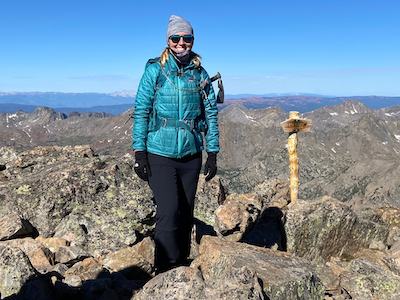Maintaining wellness during a pandemic

Living through a once in a century pandemic can take a toll.
Whether it’s worries about getting sick or watching a loved one fall ill, to losing one’s sense of routine and social connections, people everywhere are stressed out and scared. Dentists are no exception.
In an Aug. 24 ADA Health Policy Institute poll , more than half of the 4,000 dentist respondents reported experiencing personal challenges with anxiety, financial problems, sleep quality, weight change and/or depression during COVID-19.
“My friends and I have talked about this in depth,” said Dr. Lindsay Compton, a new dentist and practice owner in Arvada, Colorado. “We feel a loss of connection with our dental peers. Attending in-person continuing education andsocial events through state and local dental societies charges our batteries and gives us a sense of community.”
“We also feel a great amount of stress from our patients,” she continued. “As dentists weare seen as leaders and many of them look to us for answers. Our patients come in with their own hypothesis and the current issues are more polarizing than ever. People are at extremes and we are often the dumping ground for their thoughts. We also have sacrificed physical wellness, fitness classes and gyms, to avoid contracting the virus or to save money. We miss our dopamine from physical exertion.”

To get some of that “feel-good” chemical, Dr. Compton has turned to one of her passions: being outdoors.
“This summer I wanted to climb more 14,000-foot mountains,” she said. “We call them 14ers in Colorado. I did a hard one in July and loved how I felt, and it gave me something to talk to my patients about besides what the news is reporting and the weather.”
The outdoors has also served as a balm for Dr. Joe Vaughn, an associate and publichealth dentist in Seattle.
“For my wife (fellow new dentist, Dr. Rita Mackert) and I, it was a newfound passion in day hiking during the COVID-19 shutdown, and there’s plenty of that to go around in the beautiful state of Washington,” he said. “We’re also big fans of neighborhood [outdoor] happy hours as well as something as simple as going out for a drink with our friends.”
Another issue dentists may be facing isburnout. People who were experiencing mental, physical or emotional burden even before the virus hit, may be even more drained now.
“The first thing I focus on is the fact that I’m not alone,” Dr. Vaughn said. “I think the thing that’s truly special about dentistry and organized dentistry in particular, is that it’s made up of a very supportive network of people who really want to see each other succeed.”
Dr. Compton recommended creating boundaries between work and off time, including setting limits for social media or any type of engagement that drains or uplifts. For her, that means looking for inspiration outside of work.
“I love dentistry, but it can be obsessive,” she added. “If I want to avoid burnout but still be connected, I choose one solitary procedure and focus on this until I exhaust myself. The beauty of dentistry is that we can get overwhelmed by the information and the variety. Focus on one thing and achieve excellence.”
Dr. Vaughn urges his fellow dentists not to bury the negative feelings when they come.
“In the moments when I’m feeling particularly unsuccessful and the doubt starts to creep in, the first thing I do is lean on my wife and my friends and my colleagues for support and camaraderie,” he said. “If I keep them all inside, it ends up taking quite the toll on my mental wellness. I believe in using your support system, and I consider that ability to reach out as a true strength in our careers.”
Challenges like never before
Dr. Vaughn believes new dentists today are facing challenges that no other generation has had to face.
“Not only do we find ourselves with the highest student debt in history, working in the most competitive environment in history, but we are also able to see what every dentist in the country is doing right this very second.”
He advised to limit social media during these times.
“I don’t think we realize how mentally taxing it can take to see nothing but success and awesomeness and high-profile dentistry on Instagram and then wonder what you’re doing wrong and why you aren’t having that same experience,” he said. “There’s so much noise out there these days. There’s so many people trying to write your own personal story, tell you how you should be leading your career, and that leads to a lot of stress, anxiety, and doubt that this is even the right profession for you. We need to learn to tune out all that noise and just focus on ourselves and write our own stories.”
The ADA offers tips for dentists on wellness. Visit ADA.org/wellness to access all the Association’s resources.
There is also the ADA webinar, “ Emotional Impact — Dealing Constructively with Stress in the Midst of COVID-19 ,” which features three dentists from the ADA’s Dentist Wellness Advisory Committee who talk about the emotions surrounding the most common fears and stressors dentists have reported experiencing before, during and after reopening their practices.
Visit ADA.org/virus and look under the “Mental Health” tab for this webinar and all ADA resources.



